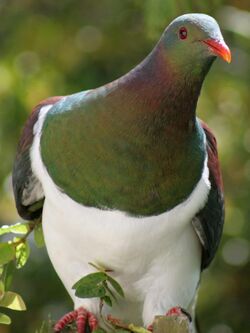Biology:Hemiphaga
| Hemiphaga | |
|---|---|

| |
| Hemiphaga novaeseelandiae | |
| Scientific classification | |
| Domain: | Eukaryota |
| Kingdom: | Animalia |
| Phylum: | Chordata |
| Class: | Aves |
| Order: | Columbiformes |
| Family: | Columbidae |
| Subfamily: | Ptilinopinae |
| Genus: | Hemiphaga Bonaparte, 1854 |
| Type species | |
| Columba novaeseelandiae Gmelin, 1789
| |
| Species | |
|
See text | |
Hemiphaga is the genus containing two species of large pigeons from New Zealand.
There are two subspecies of New Zealand pigeon, Hemiphaga novaseelandiae: H. n. novaseelandiae of mainland New Zealand and the Norfolk pigeon (H. n. spadicea) of Norfolk Island, now extinct. The subspecies differed in their plumage colour and shape.[1]
In 2001, it was proposed that a third subspecies, H. n. chathamensis or the Chatham Island pigeon, was distinct enough to be raised to full species status as H. chathamensis.[2] This has since been accepted by most authorities.[3][4]
Taxonomy
The genus Hemiphaga was introduced by the French naturalist Charles Lucien Bonaparte in 1854 with the New Zealand pigeon (Hemiphaga novaeseelandiae) as the type species.[5] The name combines the Ancient Greek hēmi meaning "half-" or "small" with the end of the genus name Carpophaga introduced by Prideaux John Selby in 1835.[6]
The genus contains two species:[7]
| Image | Scientific name | Common name | Distribution |
|---|---|---|---|
 |
Hemiphaga novaeseelandiae | New Zealand pigeon or kererū | Northland to Stewart Island/Rakiura and offshore islands |
 |
Hemiphaga chathamensis | Chatham pigeon or parea | Chatham Islands in New Zealand |
References
- ↑ James, R. E. (1995). Breeding ecology of the New Zealand pigeon at Wenderholm Regional Park. p93. School of Environmental and Marine Science. University of Auckland, Auckland.
- ↑ Millener, P. R., and R. G. Powlesland. (2001). The Chatham Island pigeon (Chatham pigeon) deserves full species status; Hemiphaga chathamensis (Rothschild 1891); Aves: Columbidae. Journal of the Royal Society of New Zealand 31:365–383.
- ↑ "Updates & Corrections – December 2009 | Clements Checklist". https://www.birds.cornell.edu/clementschecklist/updateindex/dec09overview/dec09/.
- ↑ "SPECIES UPDATES-Version 1.5 (January 16, 2008)". 16 January 2008. https://www.worldbirdnames.org/updates/archives/species-v1/.
- ↑ Bonaparte, Charles Lucien (1854). "Coup d'oeil sur les pigeons (deuxième partie)" (in French). Comptes Rendus Hebdomadaires des Séances de l'Académie des Sciences 39: 1072–1078 [1076–1077]. https://www.biodiversitylibrary.org/page/2820257.
- ↑ Jobling, James A. (2010). The Helm Dictionary of Scientific Bird Names. London: Christopher Helm. p. 189. ISBN 978-1-4081-2501-4.
- ↑ Gill, Frank; Donsker, David; Rasmussen, Pamela, eds (2020). "Pigeons". IOC World Bird List Version 10.1. International Ornithologists' Union. https://www.worldbirdnames.org/bow/pigeons/.
Wikidata ☰ Q1195661 entry
 |

